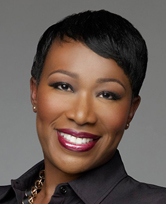October 11, 2016 — Joy-Ann Reid, host of MSNBC’s “AM Joy” discussed the role of race within the Republican and Democratic parties, the Black Lives Matter movement, and the need for the U.S. to reckon with its history, in a discussion with Shorenstein Center Director Nicco Mele.
Reid, who is the author of the 2015 book, Fracture: Barack Obama, the Clintons, and the Racial Divide, and former managing editor of theGrio.com, also discussed why demographics favor a Clinton win and what to expect from a Clinton presidency, the generational divide among African Americans, and conflicts within both parties, among many other topics. Below are some highlights from the conversation, as well as the full audio recording. Also available on iTunes.
How the backlash against President Obama led to the rise of Trump
“When Barack Obama gets elected, it’s kind of a second version of [Reconstruction]. It’s saying to black citizens, you have the ultimate badge of full citizenship, the ability to be the president of the United States.” Republicans, said Reid, chose to respond as if “this didn’t happen, he’s not the president, we’re going fight him like he didn’t really win…and he’s not American and he’s not a citizen of the United States…It produces in a lot of the base of the Republican Party a sense that they don’t have to respect the presidency as long as he’s in it.”
[Trump] exemplifies the impotent rage of people who say ‘why do we keep losing to this man who is not the president and who shouldn’t be there.’
“They also were convinced that if they just elect these people, this movement calling itself the Tea Party, they can overthrow him, they can stop him,” said Reid. “Of course, we’re not a parliamentary democracy, 40 Tea Partiers cannot stop him, so the disappointment from that—they won’t go at him on his birth certificate, they won’t say he’s illegitimate…this sense that their own side was too weak to really fight him keeps building this rage on the right that eventually, somebody was going to fill that need—and Donald Trump has filled the need. He exemplifies the impotent rage of people who say ‘why do we keep losing to this man who is not the president and who shouldn’t be there.’”
Does the Democratic Party take minority voters for granted?
“Lyndon Johnson signs this heroic civil rights bill in ‘64, but they left out voting rights because they couldn’t get it through…then you have Selma happen and they have to go back for another round, and LBJ can’t believe he’s being sent back in by these civil rights leaders. He gets that through…they go back to get housing discrimination through…but what that produces in Lyndon Johnson and in the Democratic party is this incredible sense of entitlement to the African American vote—‘we did this for you, your votes belong to us.’”
“Because Republicans had to absorb the white southern vote, that white racially conscious vote, it drives other voters of color into the Democratic Party.” Asian Americans, who can be more politically conservative than other minorities, still tend to vote Democratic said Reid, because “they see the treatment of black and Hispanic people as a line they’re getting in. They know that eventually this idea of being anti-immigrant will hit them next.”
In the 1970s, during the Nixon administration, up to 30 percent of the black vote “was in play,” said Reid. “One of the reasons African Americans don’t have a lot of power is it’s 90/10 and Democrats think, ‘we got you—we don’t even have to come to your community until six weeks before the election. And it’s partly because the Republican Party is so venal in its discussions of African American life… even the way the media talks about black people, it’s always crime. What about environmental justice…what about small businesses? But the Republican Party has become so hostile sounding because it has married itself to right-wing talk radio, to the Rush Limbaugh style of communication.”
The way the Civil Rights Movement operated was to say ‘we’re not going to get beaten in the dark, we’re going to get beaten in the light.
Although Reid noted some successes of the Black Lives Matter movement, with its dispersed nature being an advantage in preventing leaders from being targeted, she also said that unlike the Civil Rights Movement, Black Lives Matter lacks a strong connection to power and institutional breadth and depth. “If you reject politics as grimy, as politics can be…politics is still with you. The Democratic Party is starved for youth, it is starved for talent. The average age of the truly activist Democrat is like 70. Seriously. Elizabeth Warren is [67]. Bernie Sanders is the same age as Jesse Jackson, they are [75] years apiece. That is not how you grow a Democratic Party—there’s not enough youth. If the Black Lives Matter activists would focus their attention on elections, on electing members of their own group and like-minded politicians, they would have so much more power.”
The role of the media in the 2016 election
We’re responding to a marketplace that is demanding to see more circus, more shoes being thrown.
On reckoning with race and history in America
We can’t face our own villainy, so we can’t change.
This event was co-sponsored by the Ash Center for Democratic Governance and Innovation as part of the Race and American Politics series.
Article by Nilagia McCoy of the Shorenstein Center.


